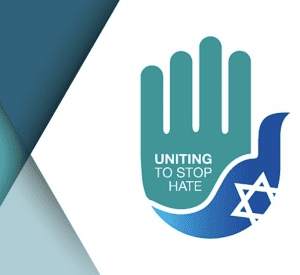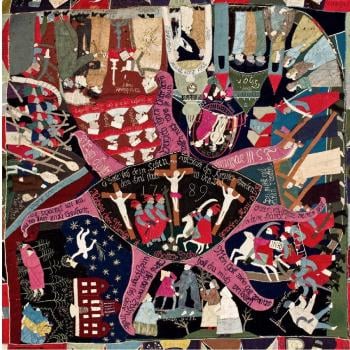
The news is not good. Antisemitism, and that means violent antisemitism, is rising again in the world. It can be found in France. It can be found in Australia. And without surprise, it finds itself once again in Central and Eastern Europe, as William Galston explained in the Wall Street Journal:
“The latest global survey conducted by the Anti-Defamation League finds that anti-Semitic attitudes have increased significantly since 2015 in Central and Eastern Europe, which before the Holocaust was home to most of European Jewry.”[1]
Likewise, we find it is growing in the United States. Writing for the Jewish News of Northern California, Aaron Keyek tells us not only the perception the Jews have on the rise of anti-Jewish hostility, but the actual harm which has been done to the Jews can be objectively demonstrated to be worse today than a few years ago:
In a just-released survey by the American Jewish Committee, more than 80 percent of Jewish respondents say they have witnessed an increase in anti-Semitic incidents in the United States over the past five years, with 43 percent indicating that the increase has been significant.
That anti-Semitism is spiking is not only a matter of perception, however. The Anti-Defamation League reported a 150 percent increase in recorded incidents comparing 2013 with 2018.
American Jews clearly see that the hike in white supremacy goes hand in hand with the hike in anti-Semitic incidents across our country: 89 percent of AJC respondents believe the extreme political right presents a threat to Jews.[2]
It’s all over the United States, with instances of antisemitic activities found, for example, in Indiana, New York and Massachusetts. Thus, in Boston Magazine, we can read what Jews around the United States are beginning to experience from their fellow Americans (and, sometimes, when dealing with Christians who with a Jewish background, from their supposed Christian brethren):
Since the 2016 presidential campaign, hate crimes against many minorities have increased throughout the country. Here in Greater Boston—home to one of the 10 largest Jewish communities in the world—the biggest and most conspicuous jump has been in incidents targeting Jews. The recent wave of anti-Semitism includes neo-Nazi graffiti, attacks on property, and the local mobilization of virulently anti-Semitic white supremacist groups.[3]
Understanding what is going on, Pope Francis made a plea for it to stop. He knows antisemitism is on the rise, that Jews are once again being scapegoated and that they are once again finding their livelihood put at risk. Pope Francis also understands that this antisemitism is often coming from so-called Christians, and so he makes it clear, Christians are not to look down upon Jews, to treat them with distrust or disrespect; they are to be considered to be a loving a part of one large spiritual family:
I would like to pause here. Jewish people have suffered greatly throughout history. They were exiled, persecuted … And in the last century, we saw very great brutality perpetrated against Jewish people and we were all certain that this had ended. But scattered here and there, today the habit of persecuting Jews is beginning to reappear. Brothers and sisters, this is neither human nor Christian. The Jews are our brothers! And they should not be persecuted. Understood?[4]
Pope Francis is merely repeating the official teaching of the church as stated by Nostra Aetate:
Furthermore, in her rejection of every persecution against any man, the Church, mindful of the patrimony she shares with the Jews and moved not by political reasons but by the Gospel’s spiritual love, decries hatred, persecutions, displays of anti-Semitism, directed against Jews at any time and by anyone. [5]
The relationship between Jews and Christians, with the fact that Christianity came out of Judaism, should be one of much love and charity, instead of spite and hatred. This is why Pope Francis said there is a contradiction between antisemitism and Christianity: “I stress that for a Christian any form of antisemitism is a rejection of one’s own origins, a complete contradiction.”[6] Pope Benedict XVI likewise stressed this relationship between Christianity and Judaism as being important, and should result in good will between the two:
Christians and Jews share to a great extent a common spiritual patrimony, they pray to the same Lord, they have the same roots, and yet they often remain unknown to each other. It is our duty, in response to God’s call, to strive to keep open the space for dialogue, for reciprocal respect, for growth in friendship, for a common witness in the face of the challenges of our time, which invite us to cooperate for the good of humanity in this world created by God, the Omnipotent and Merciful.[7]
What led to antisemitism in the past, and what leads to it today. is a rejection of the teachings of the Gospels in favor of political and racial ideologies. The Gospel teaches benevolence, to love one’s neighbor; Jesus consistently went to outsiders, to those denigrated by political, religious, and racial ideologues and lifted them up, showing them to be equally human and worthy of love and respect. When this is forgotten, when a particular ideological perspective is raised up over the command of love, then it easily becomes the means by which unseemly cruelty towards others, including their death, becomes unjustly justified. While Jesus is not to blame for the genocide of the Holocaust, because his teachings ran contrary to the ideology which promoted it, we must acknowledge that this is not true for Christians. Christians slowly ignored Christ and his teachings for the sake of their own particular nationalistic ideologies. Slowly, they turned differences of belief between Jews and Christians as an excuse for notions of supremacy, supremacy which then allowed for the total destruction of the Jews. While far from perfect before the Middle Ages, it is quite clear, authoritarian ideologies slowly took over the imagination of many Christians in Christendom, and the Jews, once treated with some respect because of their historical relationship with God, became seen as an enemy to be destroyed.[8] All of these aberrations, which became a part of Christendom, and influenced many Christians during the second millennium, sadly were not sufficiently repudiated before the Holocaust. As such, Christians joined in and promoted the ideologies which ended with the so-called “Final Solution,” the ideologies which promoted some of the greatest evils in the 20th century, evils which were all aimed at peoples Christians should have loved and respected instead of tortured and killed.
Now, after the Holocaust, Pope after Pope has spoken out and said, like St John Paul II, “The Church firmly condemns all forms of genocide, as well as the racist theories that have inspired them and have claimed to justify them.”[9] The problem is, with the history of Christianity, despite valiant figures like Reuchlin or Solovyov to the contrary, Christians have a heritage to look back to which promotes antisemitism, and so those who claim to be traditional use the existence of such ideologies in the past as indication of what Christians should be promoting today. This is why so-called traditionalist circles are a hotbed of antisemitism. They are bringing back what the church has properly disallowed, rejecting the church and its authority to disavow the errors of the past.
To be sure, antisemitism must not be confused with disagreement with the Jews in regards matters of the faith. Christians and Jews certainly disagree with each other on many dogmatic issues. But such disagreement should not be used to justify abuse of any kind (verbal, physical, etc.). Christians should be able to explain their faith and why they believe what they believe without denigrating the Jews, just as Jews should be able to explain their faith without denigrating Christians. It’s not disagreement, but how the disagreement is managed and dealt with, which causes problems. Indeed, Christians should look to the Jews, respect them and their tradition, and indeed, learn from them because Christianity emerged from the Jews. If Christians hold this kind of respect of the Jews despite their differences, Christian antisemitism would die, because antisemitism is founded on disrespect and hate.
Truly, it has been a remarkable thing that Jews and Christians have slowly come together and begun to see each other in a new light. Christians, however, must keep in mind that they have much to prove to their Jewish brethren, to show that it is not just a passing fancy. The long history of Christian abuse against the Jews, in nations controlled, at least in name and theory, by Christian leaders, rightfully gives many Jews pause against trusting the motives of contemporary Christians. They see that despite the good desires of many Christians, many other Christians continue with antisemitism, that it has not only not been rooted out, but it is emerging once again with people coming into power with such antisemitic ideologies. Christians must do better to police themselves, and properly repudiate all such antisemitism wherever it rises. We cannot remain indifferent, for indifference, as Pope Francis suggests, is a part of the problem which lies before us:
I do not grow tired of repeating that indifference is a virus that is dangerously contagious in our time, a time when we are ever more connected with others, but are increasingly less attentive to others. And yet the global context should help us understand that none of us is an island and none will have a future of peace without one that is worthy for all.[10]
The past is important. A proper examination of it can tell us what we have done wrong so we do not have to repeat the errors of the past. We must reject so-called traditionalism which looks to all that was done in the past as good in comparison to the church of today, because all it will do is repeat the sins of the past, sometimes with more tragedy, but often with much more farce (such as can be found in those claiming to be traditional Catholics acting untraditionally in their disrespect for the Pope). Being traditional requires one to follow a living tradition, and anything else, is a dead letter which knows not the spirit of truth.
The rise of antisemitism should alarm us. Christians should be especially concerned, because much of the antisemitism is coming from them and the revival of past ideologies which Christians once preached in contradiction to the Gospel. The Jews must be respected, not denigrated. They must be protected, not harmed. Any and all ideologies of supremacy which lead to racist reactions, including those of antisemitism, must be denounced in no uncertain terms.
[1] William A. Galston, “Anti-Semitism Soars in Eastern Europe,” Wall Street Journal (11-26-2019).
[2] Aaron Keyek, “Anti-Semitism is rising in the U.S. — and many Jews blame Trump,” The Jewish News of Northern California (10-28-2019).
[3] Michael Damiano, “Massachusetts Has an Anti-Semitism Problem, and It’s Only Getting Worse,” Boston Magazine (11-8-2019).
[4] Pope Francis, “General Audience” (11-13-2019). Vatican translation.
[5] Nostra Aetate. Vatican translation. ¶4.
[6] Pope Francis, “Address to Members of the Jewish American Committee” (3-8-2018). Vatican translation.
[7] Pope Benedict XVI, “Visit to the Synagogue of Rome, Address of Pope Benedict XVI.” (1-10-2010). Vatican translation. ¶9.
[8] See Gilbert Dahan, The Christian Polemic against the Jews in the Middle Ages. Trans. Jody Gladding (Notre Dame, IN: Notre Dame University Press, 1998) for an introduction to this problem.
[9] St. John Paul II, “Address to a Symposium on the Roots of Anti-Judaism” (10-31-1997). Vatican translation. ¶4.
[10] Pope Francis, “To the Participants In the International Conference on the Responsibility of the States, Institutions and Individuals to Fight Anti-Semitic Hate Crimes.” (01-29-2018). Vatican translation.
Stay in touch! Like A Little Bit of Nothing on Facebook.
If you liked what you read, please consider sharing it with your friends and family!













